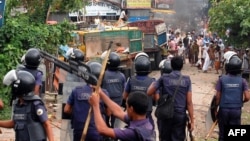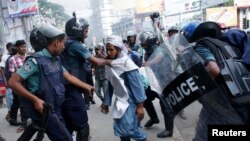NEW DELHI —
Fiery clashes between Bangladeshi security forces and Islamic hardliners demanding the implementation of anti-blasphemy laws have killed at least 20 people in and around the capital Dhaka since Sunday.
Police worked Monday to clear Dhaka, Bangladesh’s capital, of any remaining protesters, a day after tens of thousands of members of the radical Islamic group Hefajat-e-Islam took to the streets.
Islamists blocked roadways and fought with police late Sunday, while shouting “God is great” and calling for the Awami League-led government to enact stronger Islamic policies.
The newly formed Hifazat-e-Islam has put forth a list of 13 demands including mandatory Islamic education for all, the segregation of men and women, and death to so-called "atheists".
Former Bangladeshi law minister and current Supreme Court senior advocate Kamal Hossein said such demands will get little support in a country that - despite being 90 percent Muslim - has remained secular since independence.
“I can honestly say that there is complete consensus in the country on non-communal democracy and not getting communalism revived again, not seeing religion mixed up with politics," Hossein said. "Pakistan is having enough difficulties with it for people to just look across [and see how they are faring]. And I have spoken to people from Pakistan and they say ‘you are so fortunate to have been able to have non-communal politics.”
Hifazat’s protest is in response to mass rallies earlier this year that were fueled by social media. The bloggers and young demonstrators are calling for the death penalty for those who committed war crimes during Bangladesh’s fight for independence from Pakistan in 1971.
In February, a special war tribunal sentenced the leader of Bangladesh’s main Islamic political party Jamaat-e-Islami to death for his role in mass killings, rapes and other atrocities committed during the war. Jamaat is an ally of the country’s main opposition Bangladesh Nationalist Party.
Former minister Hossein said the ruling government must send a strong unified message to those who try and question the country’s constitution that is based on secularism.
He added that mal-governance, corruption, and a lack of accountability in Bangladesh have created an opening for extremist voices. Hossein pointed to the recent garment factory collapse that killed more than 600 people as an example.
“The parliament member who is supposed to have given all kind of cover for these criminal activities [that led to the factory collapse], she is not being asked to explain what has happened [in parliament]. This dissatisfaction with what should be a strong democracy is what opens up the possibility for others to come and say ‘we have the answer' -- of course, they don't have the answer,” Hossein stated.
For now, Bangladeshi authorities are left to clean up the aftermath of Sunday’s violent protests and mourn many of the police and paramilitary soldiers who are among the dead. Police have banned all rallies and demonstrations in Dhaka on Monday to prevent further clashes.
Police worked Monday to clear Dhaka, Bangladesh’s capital, of any remaining protesters, a day after tens of thousands of members of the radical Islamic group Hefajat-e-Islam took to the streets.
Islamists blocked roadways and fought with police late Sunday, while shouting “God is great” and calling for the Awami League-led government to enact stronger Islamic policies.
Hifazat-e-Islam Fact Box
Hifazat-e-Islam- Coalition of Islamic organizations, scholars and clerics
- Rose to national scene after murder of blogger Rajib Haider, who had been accused of anti-Islam writings
- Seeking anti-blasphemy law that includes death penalty
- Wants law to punish bloggers who insult Islam
- Wants a ban on women and men mixing in public
- Calls for an end to candlelit vigils
Former Bangladeshi law minister and current Supreme Court senior advocate Kamal Hossein said such demands will get little support in a country that - despite being 90 percent Muslim - has remained secular since independence.
“I can honestly say that there is complete consensus in the country on non-communal democracy and not getting communalism revived again, not seeing religion mixed up with politics," Hossein said. "Pakistan is having enough difficulties with it for people to just look across [and see how they are faring]. And I have spoken to people from Pakistan and they say ‘you are so fortunate to have been able to have non-communal politics.”
Hifazat’s protest is in response to mass rallies earlier this year that were fueled by social media. The bloggers and young demonstrators are calling for the death penalty for those who committed war crimes during Bangladesh’s fight for independence from Pakistan in 1971.
In February, a special war tribunal sentenced the leader of Bangladesh’s main Islamic political party Jamaat-e-Islami to death for his role in mass killings, rapes and other atrocities committed during the war. Jamaat is an ally of the country’s main opposition Bangladesh Nationalist Party.
Former minister Hossein said the ruling government must send a strong unified message to those who try and question the country’s constitution that is based on secularism.
He added that mal-governance, corruption, and a lack of accountability in Bangladesh have created an opening for extremist voices. Hossein pointed to the recent garment factory collapse that killed more than 600 people as an example.
“The parliament member who is supposed to have given all kind of cover for these criminal activities [that led to the factory collapse], she is not being asked to explain what has happened [in parliament]. This dissatisfaction with what should be a strong democracy is what opens up the possibility for others to come and say ‘we have the answer' -- of course, they don't have the answer,” Hossein stated.
For now, Bangladeshi authorities are left to clean up the aftermath of Sunday’s violent protests and mourn many of the police and paramilitary soldiers who are among the dead. Police have banned all rallies and demonstrations in Dhaka on Monday to prevent further clashes.





